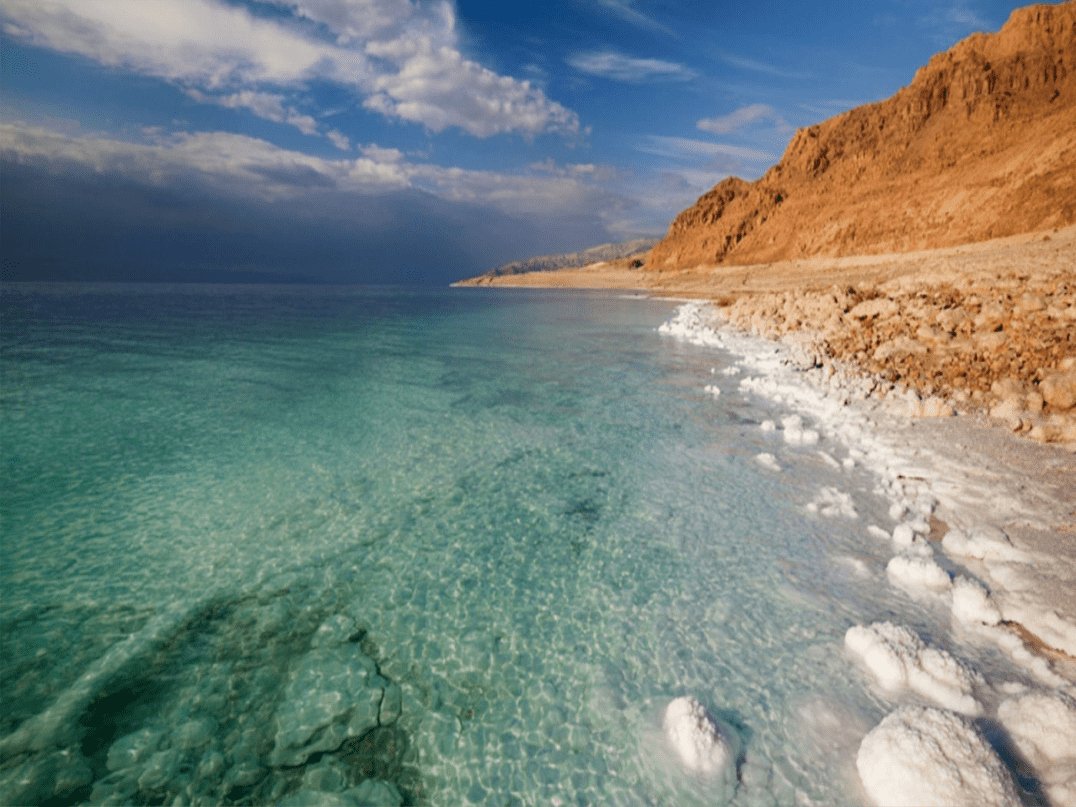Dead Sea: You’ll Float, Too! One Of The Saltiest Water Bodies


Winding your way down through the Jordan Rift Valley to the lowest point on Earth at 1,312 feet (400m) below sea level, you’ll certainly find the landscape to be dramatic and beautiful. And when you eventually arrive at your final destination, the Dead Sea has a beauty that almost seems almost unearthly.
The Dead Sea is a huge stretch of water fed by different sources of water. One of which is the Jordan River. However, being flanked by the rolling hills of Palestine to the west and the Abarim mountains of Jordan to the east and southeast, the sea is landlocked with the water having no place to go. As a result, these waters are evaporated by the hot sun. This leaves behind a dense, rich, combination of salts and minerals that provide industry, agriculture and medicine with some of its premium products.
Perhaps the most well-known product to come from the Dead Sea is its mud. Dead Sea mud is purported to have hydrating, beautifying, purgative and symptom relieving properties. Most hotels provide their guests with Dead Sea mud as one of their amenities. So, if you’re already out floating around, go ahead and give yourself a free Dead Sea mud mask that so many people back home pay so much for.
You’ve probably seen pictures of people floating in the Dead Sea with seemingly little effort; quite often they’re even reading a book or newspaper while they’re floating. You may even wonder to yourself how they do it. Well, another advantage of the extremely high concentration of dissolved mineral salts in the water is that it causes the water to be denser than that of plain fresh water. Since our body weight is less dense than the density of the water, our body is more buoyant in the Dead Sea, making it easier to float. This means that you’ll float, too, and you simply cannot leave the Dead Sea without trying this at least once. So come on – put on your swimwear, grab your choice of reading material, and have your friend
snap a few selfies of you floating away on the Dead Sea!
The area around the Dead Sea is sparsely populated and peacefully quiet now. However, the area is believed to have been home to five Biblical cities: Sodom, Gomorrah, Adman, Zebouin and Zoar (Bela). Additionally, an infamous pillar of salt said to be Lot’s wife is located on a hill near Ghor Al Safi.
Traveling by road is pretty much the only way of getting to the Dead Sea from Amman.
If you plan on driving yourself, you can get to the Dead Sea, Jordan, from Amman by way of Jordan’s Desert Highway. Roads leading to the Dead Sea are clearly marked by brown tourist signs. Likewise, you can make the long, ambitious 3-hour drive from Aqaba in southern Jordan if you’re coming from that direction.
Taxis and ride sharing services from downtown Amman to the Dead Sea are also available. The price is usually between 25JDs to 35JDs, depending on which service you use. Always check and agree with the driver before getting in the vehicle. However, tourists, like all places in the world, are unfortunately taken advantage of by a few nefarious drivers looking to make an easy buck.
There are also daily JETT buses from Amman to the Dead Sea that leaves at 8:30am from outside the Intercontinental Hotel in Amman. Then, from 9:00am at the JETT office near the 7th Circle. The bus arrives at the Dead Sea at 10am, and arrives back in Amman at 6:00pm.
As far as weather goes, the area around the Dead Sea averages a high of 38°C in summer and 20°C in winter. The area receives an average of 330 days of sunshine per year, with rainy days occurring only during the winter.
During winter and spring there is a danger of flash floods on rainy days. The Dead Sea basin receives rainwater from relatively far-off areas like the Jerusalem Mountains. This means that sometimes during a sunny day, a flash flood can and will suddenly and unexpectedly occur. Therefore, be careful when hiking in distant and narrow places during these seasons. Also, stay tuned to the weather forecasts and ALWAYS do as national reserves staff order. They know the terrain very well!
Above all, be safe and have fun crossing the Dead Sea off of your bucket list.
If you would like to know more about places you can travel in Jordan (or any of the other Arabic speaking countries) and would like to learn how to speak Arabic to make your journey easier and more exciting, why not check out the Kaleela Arabic learning app? Everybody knows that the best way to learn Arabic is through the use of Arabic learning apps like the Kaleela Arabic learning app. Visit our website and find out how you can learn Levantine Arabic or any of the other Arabic dialects spoken throughout the region by downloading the Kaleela Arabic learning app to your IOS or Android mobile device today.